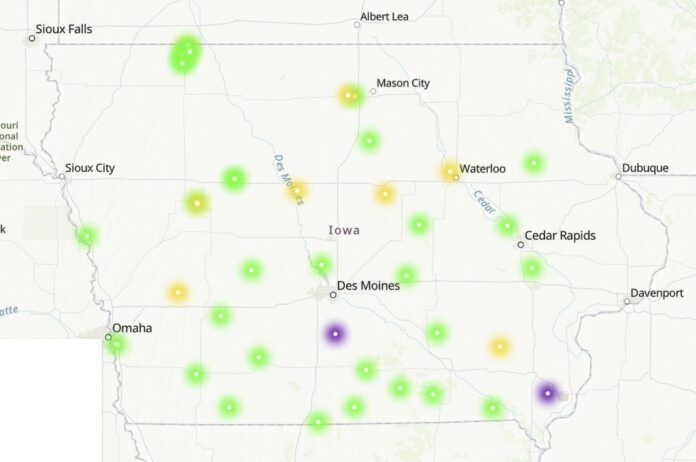From about Memorial Day through Labor Day, the Iowa Department of Natural Resources (DNR) conducts weekly monitoring of bacterial pollution in Iowa’s 39 state park beaches.
The DNR analyzes water samples from the beaches for certain one-celled microorganisms, known as indicator bacteria, that are visible only under a microscope. High levels of E. coli, a common indicator bacteria, indicate feces is in the water. In Iowa livestock are the most common source of feces in surface waters.
These indicator bacteria are commonly used by state environmental agencies and by the U.S. Environmental Protection Agency to determine the suitability of beaches for swimming-type uses.
Microcystin, a toxin produced by harmful blue-green algae blooms, has also been detected in Iowa’s water bodies.
Due to health risks, when microcystin or E. coli levels exceed certain standards/thresholds, the DNR posts swim advisories telling beach-goers to stay out of the water.
The Iowa DNR and the Iowa Environmental Council track these weekly beach monitoring reports and swim advisories and compare advisory trends from year to year. To review recent trend data, visit the Iowa DNR website.
Six beach advisories were issued for Iowa beaches for the week of June 24, five for E. coli-related contamination and one for Microcystin-related contamination.
6 beaches with an E. coli-related advisory:
- Black Hawk Beach (Lake View, Sac County)*
- George Wyth Beach (Waterloo, Black Hawk County)*
- Lower Pine Lake Beach (Eldora, Hardin County)*
- Marble Beach (Big Spirit Lake, Spirit Lake, Dickinson County)*
- McIntosh Woods Beach (Clear Lake, Ventura, Cerro Gordo County)*
- Prairie Rose Beach (Harlan, Shelby County)*
2 Beaches with a microcystin advisory:
- Brushy Creek Beach (Lehigh, Webster County)*
- Lake Darling Beach (Brighton, Washington County)*
In addition to the state beaches, one city and county beach exceed the state’s advisory threshold for E. coli.*
Para ver este aviso en español, haga clic aquí.
*Data from the Iowa DNR State Park Beach Monitoring Program
**Data from the U.S. Army Corps of Engineers, Rock Island District

















